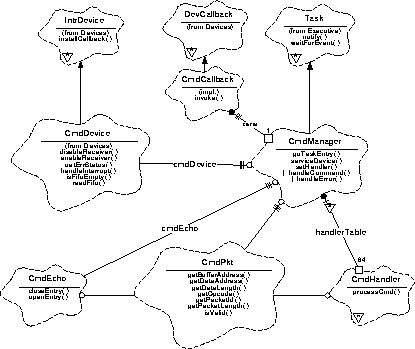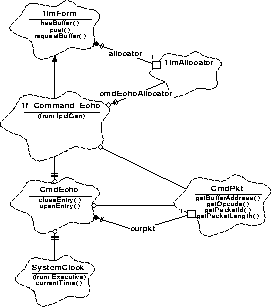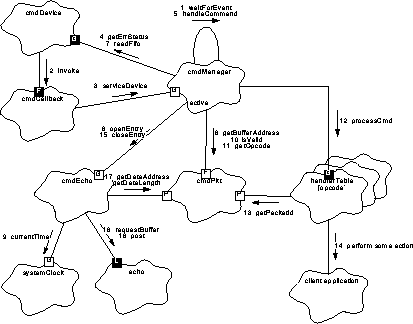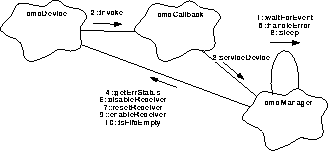 Table of Contents
Table of Contents
 Previous Chapter
Previous Chapter
ACIS
The purpose of the Command Management system is to receive, execute and log software commands received by the instrument software.
- Acquire, execute and echo commands
- Handle command device and protocol errors
Figure 59 illustrates the top-level classes and their relationships involved in processing commands, and Figure 60 illustrates the relationships used to echo command to telemetry.
FIGURE 59. Command Management Class Relationships

FIGURE 60. Command Echo class relationships

CmdManager- The CmdManager class is a subclass of Executive::Task (see Section 15.0). There is only one instance of this class, called cmdManager. This class is responsible for actively waiting for commands or errors from the command device, and for executing the commands, and recovering from errors. This class uses the Devices::CmdDevice class to provide an interface to the command hardware, the CmdCallback class to install an interrupt callback in the CmdDevice, the CmdLog class to log and echo processed commands, and the CmdPkt class to contain the body of a command packet. The CmdManager also contains a table of 64 pointers to subclass of CmdHandler. It uses the opcode field of a given command packet to lookup the corresponding handler from this table.
CmdHandler- This class is an abstract class which represents an object responsible for executing a particular command or group of commands. Every subclass of CmdHandler is responsible for implementing a command-specific processCmd() member function. This function verifies the command arguments, rejecting illegal commands, and processing accepted commands. Redundant command argument checking by other classes should be minimized.
CmdPkt- This class is used to hold the contents of a command packet, and to provide access to the packet's header information, and to its data.
CmdCallback- This class is a subclass of Devices::DevCallback. It is used by the CmdManager to obtain control during processing of command interrupts.
CmdEcho- This class is responsible for acknowledging the receipt and execution of commands. It provides functions which obtain and log the approximate arrival time of the packet (openEntry), and which forms and telemeters the echo of the command, along with its arrival time and its disposition (closeEntry).
Tf_Command_Echo - This class is a subclass of TlmForm, and is generated from the IP&CL. It is responsible for formatting a telemetry packet containing a copy of a command, its arrival time, and disposition code.
TlmForm - This class is responsible for formatting and posting telemetry packet buffers, and is described in Section 18.0.
TlmAllocator - This class is responsible for maintaining pools of telemetry packet buffers, and is described in Section 18.0.
SystemClock - This class is defined by the Executive class category, and is described in Section 15.0.
Task - This class is defined by the Executive class category, and is described in Section 15.0.
CmdDevice - This class is a subclass of IntrDevice, and is defined by the Devices class category, and is described in Section 8.0.
IntrDevice - This class is defined by the Devices class category, and is described in Section 6.0.
DevCallback - This class is defined by the Devices class category, and is described in Section 6.0.
The ACIS instrument software receives commands in the form of a series of 16-bit command words, known as a command packet. Each packet starts with a header, which is followed with any operation-specific data. The instrument operation selected by the command is specified using a Command Opcode field in the header.
The command manager assumes that all command packets appear as a series of 16-bit words, starting with the following header:
 TABLE 19. Command Packet Header
TABLE 19. Command Packet Header
---------------------------------------------------------------------------------------------
Word Field Description Min. Max.
Value Value
---------------------------------------------------------------------------------------------
0 Packet Length This field contains the length of the packet 3 256
in 16-bit words.
1 Packet Identifier This field contains an arbitrary number 0 65,535
which the instrument uses solely for log
ging purposes.
2 Command This field identifies which command to exe 0 63
Opcode cute.
3 - (Packet Data The remainder of the packet contains
Length - 1) opcode-specific data.
---------------------------------------------------------------------------------------------
This format is encapsulated using the CmdPkt class. The CmdPkt class provides access functions to the length (getPacketLength), identifier (getPacketId) and opcode fields (getOpcode), and also provides functions which return a pointer to the data area (getDataAddress), and the length of the contained data (getDataLength). In order to support echoing of commands, the CmdPkt class also provides access functions which return a pointer to the raw command buffer (getBufferAddress). NOTE: The length of the packet within the buffer can be determined using getPacketLength.
In order to eliminate the need to have interrupt handlers drain the command FIFO, the instrument software assumes that commands will not be sent faster than one command packet per Minor Telemetry Frame (i.e. about 4 commands per second), and will accept the real-time requirement that the CmdManager class must be capable of reading a command from the CmdDevice within 1 Minor Telemetry Frame (~250ms) of being written into the FIFO (including all interrupt overhead).
NOTE: The baseline requirement is to ensure that all commands be disposed of by the CmdManager in under 250ms. If a certain command causes the CmdManager to miss this deadline, then the additional delay required by the command shall be published in the ACIS Software Operators Manual.
The ACIS instrument software uses a time-based method of grouping sets of related command packets. If an error occurs while receiving a particular command, this delay is used to determine the start of the next unrelated command packet. After an error is detected, all packets which arrive within this time limit from one another will be discarded. This delay time is approximately 1 second.
Figure 61 illustrates the overall command processing scenario.
FIGURE 61. Command Processing Scenario

- The cmdManager starts up and proceeds to wait for an event indicating activity from the cmdDevice (inherited Task::waitForEvent()).
- Meanwhile, a command packet is acquired by the hardware and generates a command interrupt. The cmdDevice handles the interrupt and, as part of its interrupt processing, invokes the installed cmdCallback's invoke() member function.
- cmdCallback then invokes cmdManager.serviceDevice(). serviceDevice() then counts the interrupt and uses notify() to wake up the cmdManager task (not shown). The cmdManager's is then woken up (appearing as a return from waitForEvent()).
- The cmdManager then tests for any errors on the cmdDevice using CmdDevice::getErrStatus(). If an error is detected, the cmdManager invokes its recovery routine, handleError() (not shown). For the purposes of this scenario, assume that the device reported no errors.
- If no errors are present, the cmdManager invokes its handleCommand() function to read and execute the command.
- handleCommand() then queries a local CmdPkt for its packet buffer address, using CmdPkt::getBufferAddress().
- handleCommand() then reads the packet length and data from the cmdDevice into the acquired packet buffer using CmdDevice::readFifo().
- The cmdManager then asks the cmdEcho to record the arrival time of the packet, using CmdEcho::openEntry().
- cmdEcho.openEntry() uses systemClock.currentTime() to obtain the current BEP timer tick and records the returned value.
- The cmdManager then asks the now filled cmdPkt to perform a simple sanity check on its contents, using CmdPkt::isValid(). If the packet is invalid, the cmdManager drops into its command interface error handling code, handleError() (not shown). Assume for the purposes of this scenario, that the read packet data is valid.
- The cmdManager queries the packet for its opcode using CmdPkt::getOpcode().
- The cmdManager then uses the read opcode as index into a table of pointers to command handlers. It then invokes the handler's processCmd() member function, passing a pointer to the cmdPkt packet.
- The handler then casts the buffer to the appropriate command packet class, and obtains the packet identifier (getPacketId) and other command-specific information from the instance.
- The handler then performs command-specific operations, some of which may invoke member functions of other classes within the system.
- Once the handler returns, the cmdManager passes the returned code to cmdEcho.closeEntry() to close out the entry for the command and record the disposition of the command.
- cmdEcho.closeEntry() declares an echo telemetry packet builder, echo, and request a telemetry packet using echo.requestBuffer(). If it fails to obtain a buffer, the occurence is reported to the software housekeeper (not shown).
- If a buffer is obtained, cmdEcho.closeEntry() retrieves command header information (not shown), and the command's data buffer address and length using cmdPkt.getDataAddress() and cmdPkt.getDataLength(). It then copies the information into the telemetry packet buffer.
- Once the echo has been built. cmdEcho.closeEntry() posts the packet to telemetry using echo.post().
In order to locate the start of a command after detecting a command device or header format error, the CmdManager class uses an approach which relies on a minimum time-delay between decoupled command packets. Figure 62 illustrates this approach.
FIGURE 62. Command Recovery Scenario

- The cmdManager is in its main loop, waiting for something to happen, using the inherited function, Task::waitForEvent().
- An error occurs on the cmdDevice causing an interrupt. Its interrupt handler then invokes the installed callback cmdCallback.invoke().
- The callback then invokes cmdManager.serviceDevice(), which then wakes up the cmdManager task using cmdManager.notify() (not shown). The cmdManager then returns from its waitForEvent() call.
- The cmdManager tests the cmdDevice for an error, using cmdDevice.getErrStatus(). In this scenario, an error is present.
- The cmdManager, upon detecting an error from the cmdDevice, invokes its handleError() function.
- handleError() then enters a loop, where it disables the cmdDevice interrupt generation logic using CmdDevice::disableReceiver(). NOTE: Command words received by the instrument while the receiver is disabled are still written into the FIFO, but will not cause a command interrupt).
- handleError() resets the error condition and clears the FIFO using CmdDevice.resetReceiver()
- The error loop then sleeps (Task::sleep()) for a period of time, determined by the CmdManager variable, pktDelay (not shown).
- handleError() then re-enables the receiver using CmdDevice::enableReceiver().
- handleError() then tests the command FIFO using cmdDevice.isFifoEmtpy(). If the FIFO is not empty, or if the error condition persists (cmdDevice.getErrStatus()), handleError() repeats the process from the point of disabling the receiver. If the FIFO is empty, and the error condition is cleared, handleError() returns and the cmdManager proceeds to wait for the next command. NOTE: All software housekeeping reports in this scenario are TBD.
Documentation:
- The Command Manager is responsible for reading commands from the Command Device and for executing the received commands.
Export Control:
- Public
Cardinality:
- 1
Hierarchy:
Superclasses:
Task
Implementation Uses:
CmdDevice
CmdPkt
CmdEcho
Public Interface:
Operations:
CmdManager()
goTaskEntry()
setHandler ()
serviceDevice()
Constants:
RECOVER_SECONDS=1 second
Protected Interface:
Has-A Relationships:
- CmdHandler handlerTable[]: This table is an array of pointers to Command Handler instances. The array is indexed by command opcode.
- unsigned pktPending: This is the number of command packets contained in the command FIFO. It is incremented with each call to serviceDevice(), is decremented when each packet is processed, and is set to zero during error processing.
- const unsigned pktDelay: This read-only variable contains the number of clock ticks (1/10 second) to wait after an error to ensure the start of a subsequent packet. This value is set to RECOVER_SECONDS converted into clock ticks (i.e. multiplied by 10).
Operations:
handleCommand()
handleError()
Concurrency:
- Active
Persistence:
- Persistent
Public member of:
- CmdManager
Arguments:
unsigned taskId
Documentation:
This constructor initializes the task information. taskId is the Nucleus RTX task identifier for the CmdManager.
Semantics:
- Invoke the parent's Task::Task() constructor, passing taskId as the argument and initialize the read-only pktDelay variable to 1 second (10 timer ticks), and zero pktPending.
Concurrency:
- Sequential
Public member of:
- CmdManager
Return Class:
- void
Documentation:
- This function contains the main loop of the Command Manager task. Its loop must iterate at least once per 250ms in order to never miss a command. This function NEVER returns.
Semantics:
- Within a FOREVER loop, wait for an event (using Task::waitForEvent()). If a task monitor query is present, respond to the query. If the command device wants attention, test for errors using cmdDevice.getErrStatus(). If an error is present, call handleError(), otherwise, call handleCommand() to process any pending commands
- Time complexity: When commands are present, must be able to iterate in under 250ms
Concurrency:
- Synchronous
Protected member of:
- CmdManager
Return Class:
- void
Documentation:
- This function reads and executes one command from the Command Device.
Semantics:
- Read the packet length from the command FIFO (cmdDevice.readFifo()). If length invalid, call handleError() and return. If length valid, get packet buffer address, store length and read remainder of packet. Test the command header for legal values (cmdDevice.isValid()). If header invalid, call handleError() and return. If header ok, open the command echo entry (cmdEcho.openEntry()). Get the packet opcode and index the handler table. If the table entry is 0, log command un-implemented. If not 0, invoke the handler (handler>processCmd()), and echo the command and the returned result (cmdEcho.closeEntry()). Decrement pktPending. If pktPending is not zero, notify the task of another command using notify().
- Time complexity: Must execute in under 250ms
Concurrency:
- Synchronous
Protected member of:
- CmdManager
Return Class:
- void
Documentation:
- This function attempts to recover from errors in the Command Device.
Semantics:
- Do the following until there are no command errors reported and until the FIFO remains empty: disable the receive logic and reset the FIFO, sleep for the packet delay time, re-enable the receive logic. Zero pktPending.
Concurrency:
- Synchronous
Public member of:
- CmdManager
Return Class:
- void
Documentation:
- This function is responsible for notifying the task portion of the CmdManager when a command packet arrives. When it is invoked, it increments pktPending. It then uses notify() to issue an event to the task.
Concurrency:
- Synchronous
Public member of:
- CmdManager
Return Class:
- void
Arguments:
CmdOpcode opcode
CmdHandler* handler
Documentation:
This function writes the handler pointer into the handlerTable slot indexed by opcode, overwriting any previous handler pointer occupying that slot. If handler is 0, then commands corresponding to opcode are rejected by the cmdManager.
Concurrency:
- Sequential
Documentation:
- Command Packets are used to instruct the ACIS software to perform some action. The top-level command packet acts as the transport layer into the ACIS software.
- All Command Packets have the following, overall format:
Word 0: Length
Word 1: Packet Identifier
Word 2: Command Opcode
Words[Length-3]: Command opcode-specific data
Export Control:
- Public
Cardinality:
- n
Hierarchy:
Superclasses:
none
Public Interface:
Operations:
getBufferAddress()
getDataAddress()
getDataLength()
getOpcode()
getPacketId()
getPacketLength()
isValid()
Private Interface:
Has-A Relationships:
- unsigned short pktBuffer[256]: This buffer contains the list of 16-bit words from the command packet.
Concurrency:
- Guarded
Persistence:
- Transient
Public member of:
- CmdPkt
Return Class:
- unsigned short*
Documentation:
- This function returns a pointer to the packet buffer. This buffer is at least 256 16-bit words in length.
Concurrency:
- Guarded
Public member of:
- CmdPkt
Return Class:
- const unsigned short*
Documentation:
- If the packet contains data, this function returns a read-only pointer to the command packet's data area. The length of this area is determined by calling getDataLength(). If the packet's length does not support any data, this function returns 0.
Concurrency:
- Guarded
Public member of:
- CmdPkt
Return Class:
- unsigned
Documentation:
- This function returns the number of 16-bit words in the packet's data area. The address of this area is obtained using getDataAddress().
Concurrency:
- Guarded
Public member of:
- CmdPkt
Return Class:
- enum CmdOpcode
Documentation:
- If the packet length is valid, this function returns the opcode contained within the command packet, otherwise it returns CMDOP_INVALID.
Concurrency:
- Guarded
Public member of:
- CmdPkt
Return Class:
- unsigned
Documentation:
- If the packet's length is valid, this function returns the packet identifier contained within the command packet, otherwise it returns 0xffffffff.
Concurrency:
- Guarded
Public member of:
- CmdPkt
Return Class:
- unsigned
Documentation:
- This function returns the total number of 16-bit words delivered by the command packet. The address of the raw packet buffer is provided by getBufferAddress().
Concurrency:
- Guarded
Public member of:
- CmdPkt
Return Class:
- Boolean
Documentation:
- This function performs a top level sanity check on its contents. It returns:
BoolTrue - Sanity check passed
BoolFalse - Sanity check failed
Concurrency:
- Guarded
Documentation:
- A command handler is responsible for handling a given command from the ground. This class is an abstract class, and is intended to serve as a top level command handler template. All command handlers must be a subclass of this type.
Export Control:
- Public
Cardinality:
- n
Hierarchy:
Superclasses:
none
Public Uses:
CmdPkt
CmdEcho
Public Interface:
Operations:
processCmd()
Concurrency:
- Synchronous
Persistence:
- Persistent
Public member of:
- CmdHandler
Return Class:
- enum CmdResult
Arguments:
CmdPkt* pkt
Documentation:
This is an abstract virtual function. Subclasses of CmdHandler must implement this function to execute the command indicated by the referenced command packet, and must return the appropriate CmdResult code indicating the disposition of the command.
Time complexity: All processCmd() implementations must execute in under 250ms
Concurrency:
- Synchronous
Documentation:
- The Command Echo is responsible for echoing a command packet to telemetry.
Export Control:
- Public
Cardinality:
- 1
Hierarchy:
Superclasses:
none
Public Uses:
CmdPkt
Implementation Uses:
SystemClock
Tf_Command_Echo
Public Interface:
Operations:
closeEntry()
openEntry()
Private Interface:
Has-A Relationships:
- CmdPkt* curpkt: This points to the command packet registered via openEntry().
- unsigned arrivalTime: This indicates the approximate arrival time of the command, in BEP timer ticks.
Concurrency:
- Guarded
Persistence:
- Persistent
Public member of:
CmdEcho
Return Class:
void
Arguments:
CmdPkt* pkt
CmdResult disposition
Documentation:
This function forms and issues an echo of the command packet. The packet is indicated by pkt, and the exeuction disposition is indicated by disposition.
Preconditions:
- pkt must match curpkt and must not be zero
Semantics:
- Declare a command echo telemetry builder. Request a telemetry buffer for the instance. If successful, store the arrivalTime and disposition into the buffer, get the command header info from pkt and store into the buffer, and then copy the command body into the telemetry buffer. Once built, post the buffer to telemetry. If no buffer is available, report to software housekeeping and skip the echo.
Concurrency:
- Guarded
Public member of:
CmdEcho
Return Class:
void
Arguments:
CmdPkt* pkt
Documentation:
This function logs the arrival time of the passed command packet, pkt. It copies pkt into its private curpkt. and then uses systemClock.currentTime() to obtain the current BEP timer tick. It then stores the timer tick count into arrivalTime.
Concurrency:
- Guarded
 Table of Contents
Table of Contents
 Next Chapter
Next Chapter
 Table of Contents
Table of Contents
 Previous Chapter
Previous Chapter
 Table of Contents
Table of Contents
 Previous Chapter
Previous Chapter
 TABLE 19. Command Packet Header
TABLE 19. Command Packet Header